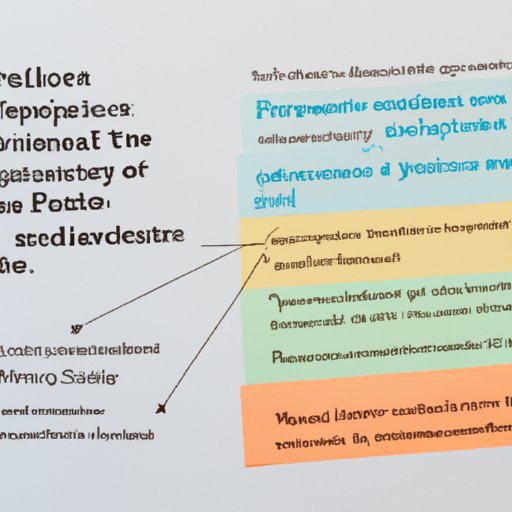Introduction
State is a core concept in political science, as it describes the collective power of a country or nation. This article will provide a comprehensive overview of the concept of state in political science, exploring its definitions, types, functions and governance structures. It will also examine the impact of state policies on society and investigate the relationship between the state and international relations.
An Overview of the Concept of State in Political Science
The term “state” can be defined as “a politically organized body of people occupying a definite territory with an organized government” (Adserballe & Gardner, 2011). In political science, the definition of state usually focuses on four core elements: population, territory, sovereignty and government. According to Max Weber, “A state is a human community that successfully claims the monopoly of the legitimate use of physical force within a given territory” (Weber, 1978, p. 78).
States can be divided into two main categories: unitary states and federal states. Unitary states are those in which the central government holds all the power, while federal states are those in which power is shared between the central government and regional governments. In addition, there is a third type of state known as a confederation, which is a loose association of states in which the central government has limited powers.
In general, states have three primary functions: maintaining order, providing security and promoting economic growth. The state is responsible for creating laws and enforcing them, maintaining public safety, protecting citizens’ rights and freedoms, providing social services and regulating the economy. In this way, the state plays an important role in shaping the lives of citizens.
Exploring the Role and Functions of the State in Political Science
The role and functions of the state are shaped by the particular governmental structures and policies that are in place. Every state has a different form of government, which can range from autocratic rule to democratic rule. Autocratic rule is characterized by one person or group holding absolute control over the state, while democratic rule is characterized by majority rule and the protection of individual rights.
The structure of government and the policies that are implemented have a significant impact on society. Policies such as taxation, welfare, education and health care all affect the lives of citizens in different ways. Therefore, the role of the state in setting these policies is critical in determining the overall quality of life in a given society.

Examining the Different Types of States in Political Science
As mentioned above, states can be divided into three main categories: unitary states, federal states and confederations. Unitary states are those in which the power lies solely with the central government. This type of state is typically characterized by a strong executive branch, centralized authority and uniform laws throughout the country. Examples of unitary states include France and Italy.
Federal states, on the other hand, are characterized by a division of power between the central government and regional governments. This type of state is typically characterized by a strong legislative branch, decentralized authority and varying laws across different regions. Examples of federal states include the United States and Germany.
Finally, confederations are a type of state in which the central government has limited powers. This type of state is typically characterized by weak executive and legislative branches, and is often associated with a high degree of autonomy among the member states. Examples of confederations include the European Union and the African Union.
A Comprehensive Look at the Governance Structures of States in Political Science
The type of government that is in place in a given state has a large influence on the roles and functions of the state. Autocratic rule is characterized by one person or small group holding absolute control over the state. This type of government typically limits the freedom of citizens and does not allow for any meaningful participation in the decision-making process.
Democratic rule, on the other hand, is characterized by majority rule and the protection of individual rights. This type of government allows for greater participation in the decision-making process and a higher level of freedom for citizens. Examples of democratic states include the United States and India.

Analyzing the Impact of State Policies on Society in Political Science
The policies that are implemented by the state have a significant impact on society. Economic policies such as taxation, welfare, trade and industry can all have a major effect on the economic wellbeing of citizens. Social policies such as education, healthcare and housing can also have a major effect on the quality of life in a given society.
Political policies such as voting rights, civil liberties and freedom of expression can also have a major impact on society. These policies can determine whether citizens have the right to participate in the political process and whether they have access to information about the workings of the state.

Investigating the Relationship between the State and International Relations in Political Science
The state is also an important factor in international relations. States enter into international treaties with each other in order to cooperate on various issues such as trade, security and environmental protection. States also engage in diplomacy in order to resolve disputes and build relationships with other countries.
Furthermore, the state plays a major role in globalisation, which is the process of increased integration and interdependence between countries. Globalisation has had both positive and negative effects on states, as it has enabled increased trade and investment but has also led to the erosion of national sovereignty.
Conclusion
In conclusion, the concept of state in political science is a complex one that encompasses many different aspects. States are defined by four core elements: population, territory, sovereignty and government. States can be divided into three main categories: unitary states, federal states and confederations. In addition, the type of government that is in place in a given state has a large influence on the roles and functions of the state. Finally, the policies that are implemented by the state have a significant impact on society, as well as on the state’s relationship with other countries.
(Note: Is this article not meeting your expectations? Do you have knowledge or insights to share? Unlock new opportunities and expand your reach by joining our authors team. Click Registration to join us and share your expertise with our readers.)
